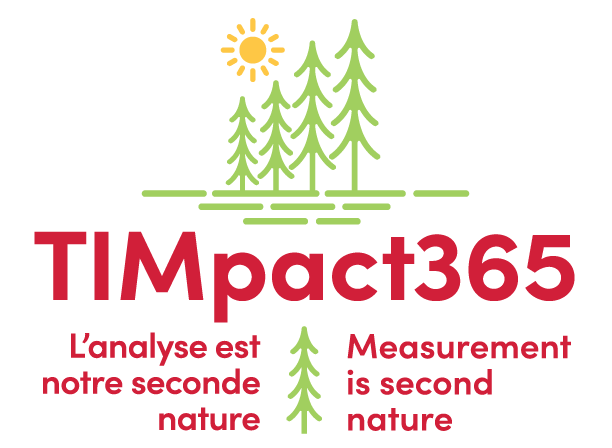
TIMpact365 is our new measurement strategy.
We measure the outcome and impact of our programs and are committed to ensuring all programs are developed and delivered through the Weikart Centre program quality framework. Together, these data provide a deeper understanding of what we do and how we impact youth in our communities.
At the heart of TIMpact365 is our commitment to quality and continuous improvement of our program quality, outcomes and impact. A series of icons has been developed to help us communicate our framework.
We use industry leading frameworks and tools to help us understand how our programs are facilitated, continually identify areas for improvement, and provide a high-quality experience for all youth. Our measurement efforts are all-encompassing as we connect with campers, the Youth Advisory Council, alumni, and staff to fully understand the camp experience.
We firmly believe that measurement is continual. We don’t just measure once, but instead we measure multiple times using a cycle. Through continual measurement we identify what we’re doing well, determine where we can improve, and implement key changes to our programs and staff training.
Program Quality Measurement
Program quality is key to understanding how Tims Camps programs are facilitated for our youth. Research shows that through participation in high-quality settings and programs, youth develop greater positive outcomes that are associated with wellbeing and thriving in young adulthood.
Program quality refers to how programs are facilitated at camp through staff practices that create four environments. The David P. Weikart Centre for Youth Program Quality (part of the Forum for Youth Investment) structures these environments in a pyramid.
The four environments are:

Copyright 2021 The Forum for Youth Investment
- Safe: The program is a psychologically and emotionally safe environment for youth. The environment is free from bias and staff actively seek to include all young people and create a space where every youth feels they belong and people with different identities are celebrated.
- Supportive: Staff create a learning environment in which young people are supported to try different things, develop new skills, and understand and manage their emotions and social interactions.
- Interactive: The environment is rich in opportunities for youth to work together to achieve goals, independently succeed, and understand others’ strengths, areas for improvement, individual perspectives, and experiences.
- Engaging: Program participants are encouraged to more deeply engage in learning and learning transfer beyond the program. Participants are also supported in taking agency, ownership, and initiative over their learning through planning and goal setting.
At Tims Camps, we began assessing program quality through our participation in the American Camp Association’s Camp Program Quality Initiative (CPQI). This was a pilot program to understand and develop sustainable systems of program quality in the camp space. We were honoured to be selected to participate in the CPQI pilot.
Learn more about the American Camp Association’s Camp Program Quality Initiative (CPQI) and to see what we’ve learned from our program quality assessments, click here.
Outcome measurement
Our programs are intentionally designed to foster positive youth development in our campers. We know that it’s important we measure their development using a well-established youth development measurement framework. One of the most commonly used is the 5Cs. Youth development of the 5Cs is associated with greater wellbeing, decreases in risky behaviours, contribution to community, and greater success in other life settings.(2)
Competence: Youth develop transferable technical, social, and emotional skills.
Confidence: Youth develop a sense of self-worth and skill mastery.
Character: Youth take responsibility, develop independence, and individuality.
Caring: Youth show empathy and sympathy for others and understand caring for others is important.
Connection: Youth create positive relationships and foster positive interactions.
For more information about the 5Cs model of positive youth development, including theoretical basis, additional definitions, and scientific references, click here. Learn about what we’ve found so far here.
Impact measurement
Our programs have short-term and long-term impacts for youth. Youth experience immediate changes after program participation but also take their camp-based learnings into other life settings, yielding long-term impacts.
When young people develop the 5Cs, they also show development in terms of contributions to themselves, their communities, and their futures.(2) We call this the “Big 3” and these impacts are emphasized in our camp-based programming with specific activities to foster this development.
Self: Youth develop a greater sense of self, determine goals for themselves, and learn to modify goals as needed.
Community: Youth understand the importance of community and positively contributing to community and the wellbeing of others.
Future: Youth look to their future with a sense of hope and optimism for what they will achieve.
Youth survey questions include research-validated measures related to self (intentional self-regulation),(3) community (pro-social behaviours),(4) and future (hopeful future expectations).(5) Year-round program participants share about their growth in these areas on an after-camp survey.
To see what we’ve learned from impact measurement, click here.
For impact and measurement related questions, reach out to us at research@timscamps.com.
Citations
- The Forum for Youth Investment. (n.d.). David P. Weikart Center for Youth Program Quality. https://forumfyi.org/weikartcenter/
- Schmid, K. L., Phelps, E., & Lerner, R. M. (2011). Constructing positive futures: Modeling the relationship between adolescents’ hopeful future expectations and intentional self-regulation in predicting positive youth development. Journal of Adolescence, 34(6), 1127–1135.
- Freund, A. M. & Baltes, P. B. (2002). Life-management strategies of selection, optimization, and compensation: Measurement by self-report and construct validity. Journal of Personality and Social Psychology, 82(4), 642-662. https://doi.org/10.1037//0022-3514.82.4.642
- Luengo Kanacri, B. P., Eisenberg, N., Tramontano, C., Zuffiano, A., Caprara, M. G., Regner, E., Zhu, L., Pastorelli, C., & Caprara G. V. (2021). Measuring prosocial behaviors: Psychometric properties and cross-national validation of the prosociality scale in five countries, Frontiers in Psychology, 12, 1-13. https://doi.org/10.3389/fpsyg.2021.693174
- Schmid Callina, K., Johnson, S. K., Buckingham, M. H., & Lerner, R. M. (2014). Hope in context: Developmental profiles of trust, hopeful future expectations, and civic engagement across adolescence. Journal of Youth and Adolescence. https://doi.org/10.1007/s10964-014-0096-9


